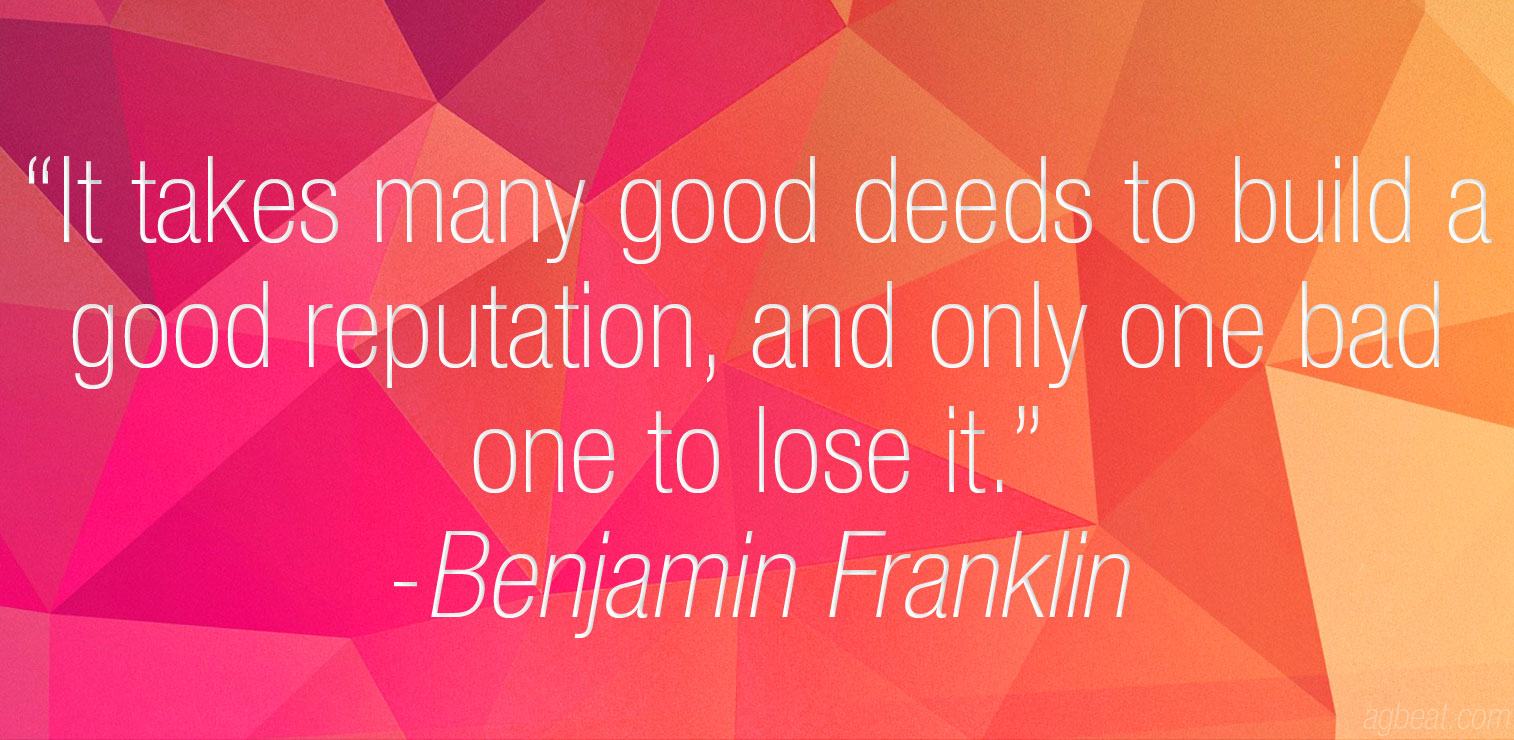
12 ways to build and protect your name online
Since you have the internet and eyeballs, you’ve probably read some articles about building a name for yourself online, but you’re not stupid, you already know you need to be on Twitter and you should have a smartphone. What are your competitors not doing online that you could immediately take advantage of?
To answer that question, we asked Scott Allen at Momentum Factor (who also happens to be one of the first social media professionals in the world, we’re serious). We were surprised that his answers were not only creative but unpredictable – there are two tips we bet you’ve never thought of.
![]()
Allen notes that Ben Franklin once noted that ““It takes many good deeds to build a good reputation, and only one bad one to lose it.” So painfully true. What follows is Allen’s own words – read and digest:
Whether you’re Joe Blow, freelancer, or owner of The Joe Blow Company, or simply Joe Blow, CEO of Something Else, LLC, your ability to do business is inextricably bound to your personal name. Even if you have focused on building the business brand over your own personal brand, web-savvy (and who isn’t these days?) potential customers, business partners and employees are going to do their homework, which includes finding out what they can about you personally. And in today’s world, Benjamin Franklin’s words are perhaps even truer than when he wrote them two centuries ago.
Consider this: every individual who has a social media account now has an online presence. That’s about 75% of Americans and only slightly lower worldwide. So unless your name is something like Zbgniew Dbrvsky, you’re competing with everyone in the world who shares your name.
On the flip side, unless you’re moderately famous (and no, slightly isn’t enough) or have been proactively building and protecting your name online, all it takes is one Ripoff Report or bad Yelp review that calls you out by name, and your name is virtual mud. If they’re really pissed, they can throw a Fiverr SEO gig at it, and it will take you months, or even years to slog your way out of it.
With that in mind, here are the top 10 action steps you can take to protect your personal name online. Some of the first ones may seem obvious, but they’re here for completeness. Keep reading and you may be surprised.
1. Google yourself. Sure, you’ve probably done it before anyway. This time, make a note of the results — namely, what are the top 20 positive or neutral results out there that are about you. You can note the negative ones, too, but we’re mainly interested at this point in finding out what you have to work with.
2. Update your bio. You want the information that’s out there about you to be current and consistent. If you’ve been online for a while, odds are that there are many different versions of your bio floating around out there. Create a short (under 160 characters), medium (one long paragraph) and long (3+ paragraphs) version. You may also want to have a version in first-person and another in third-person.
3. Join BrandYourself.com. This is an absolutely essential tool for personal branding, and yes, there’s a free version. It will a) provide an additional URL that’s likely to rank high for your name, b) help you promote your other positive URLs with a high-quality, relevant link, and c) track your progress. While there are other steps that may have more impact, the tracking capability is why you want to do this one sooner rather than later. The free version will let you track and promote three links. If you’re serious about this, it’s well worth the $100/yr. premium plan. Submit your highest-ranking links from step 1.
3. Audit and update your current social media profiles. Make a list of all your existing accounts in a spreadsheet. Make sure everything is up-to-date and that any links are going where you want them to go. Also, if any of your accounts don’t have your personal name as part of your username, you may want to consider changing that. It’s not a huge factor, but the Twitter profile for @JoeBlowCEO is going to rank better for “Joe Blow” than @ThatCEODude.
4. Claim additional social media accounts. It really doesn’t matter if you’re never going to use them — go ahead and claim your name (or your variation on it) on as many social platforms as you possibly can. Use your updated bio and set up whatever links you can to your main sites and social channels. KnowEm will do it for you, for a fee. If you want to do it on your own, use NameChk to check availability. If you want to be completely thorough, you can use Wikipedia’s lists of social networking sites, Q&A sites (Quora is a biggie), and social bookmarking sites. Best recommendation: hire a freelancer on Odesk for $2/hr. or less to do it for you.
5. Set up social media aggregation & promotion tools. Now that you have all your social media channels up-to-date, let’s promote them. Must-have tools include Empire Avenue, RebelMouse, XeeMe, About.me and Flavors.me. The key to these is that they are fairly automated — every time you put out a piece of content, it gets linked everywhere. Set it and forget it.
6. Set up Google authorship. If you want Google to know what content is actually created by you, you can now simply tell it on your Google+ profile. This has been around for a couple of years, and heavily utilized by those “in the know”. Now, Google has finally made it much easier for everyone to set this up with their step-by-step guide. Link to all of your new and newly updated social profiles.
7. Become quotable. Have you ever come up with a particularly pithy or memorable way of expressing a thought? If not, it’s time to start, and if so, it’s time to share it. Whenever you think of a nice, concise way of expressing something, put it out on your blog, social media, and quotation sites. While many of them require quotes to be “well sourced”, there are some popular ones that accept user submissions, such as SearchQuotes and QuotesDaddy. If you’re a published author, you can also submit your quotes on GoodReads and if your quote appears in an article just about anywhere, you can try submitting it at ThinkExist.
8. Be a content machine. You have now created the infrastructure to maximize your online exposure. Now you need to give it fuel. There’s no hard and fast rule about how often you should post, or what mix you should have of original content vs. curated content vs. simply sharing content from others. But whatever works for you, do it consistently across multiple platforms.
9. Publish content “off-site”. Supposedly, guest blogging for SEO purposes is dead. While that may be true for SEOs trying to do it on a large scale for the sake of backlinks, it’s certainly not true when it comes to building your personal reputation. You don’t have to do a lot of it, but having your articles published on high-traffic sites will do wonders for your online reputation. It may rank for your name on its own, but it can also gives quality backlinks to some of your top sites. It’s also a great credibility builder in your bio.
10. Give interviews. Because of the concern about guest blogging and SEO, many blogs are steering away from guest posts. But they love interviews! It doesn’t matter whether it’s audio, video, or just written. And — even better than with guest blogging — your name is going to be in the title of the post, not just the tagline, and the search engines love that.
11. Fund a movie. For anywhere from a few hundred dollars to a few thousand, you can become a film producer. “So what,” you ask. IMDB. You’ll automatically get a profile page on IMDB, and that data gets syndicated to hundreds of other sites. Look for films that match your interest and budget on Kickstarter, Indiegogo and other crowdfunding sites. Be sure that it specifies that you’ll get IMDB credit, else the only benefit will be feeling good about supporting an up-and-coming filmmaker.
12. Make a plan to keep all of this information up-to-date. Start by going back and updating your BrandYourself and Google+ profiles with all these new profiles you’ve created. Plan on checking everything at least a couple of times a year to make sure nothing’s broken. Make sure you have all of the information in one place so that if you have a major update to your bio or links, you know where to go and what to do.
Finally, keep in mind that all of these things are just outward signs — your reputation starts with your character. Treat people right, speak well of others, create value wherever you go, and you won’t have to work nearly as hard at building and protecting your reputation.
Scott Allen is one of the true pioneers of social media, helping individuals and businesses turn virtual relationships into real business since 2002. He’s coauthor of The Virtual Handshake: Opening Doors and Closing Deals Online and The Emergence of The Relationship Economy, and a contributor to over a dozen books on entrepreneurship, marketing, social media and other business topics. He is currently Director of Client Solutions for Momentum Factor, a digital marketing agency exclusively serving the direct selling industry. For fun, he enjoys spending time with family, making music, coaching entrepreneurs, pug snuggling, and bending Google to his will.
The American Genius is news, insights, tools, and inspiration for business owners and professionals. AG condenses information on technology, business, social media, startups, economics and more, so you don’t have to.










































Sarah Harris
June 2, 2014 at 7:05 pm
You really cover it all! Love the information about BrandYourself and claiming additional social media profiles. I’m definitely going to bookmark this 🙂
Nathan718
June 6, 2014 at 4:35 pm
Great article. I haven’t run across BrandYourself before. I’ll definitely have to check some of these out